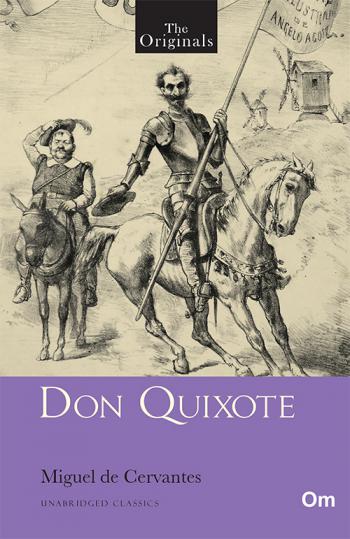The Originals: Don Quixote - Om Books
"There is no book so bad...that it does not have something good in it. One of the earliest classics from the Spanish Golden Age known as ‘the first modern novel’, Miguel de Cervantes’s Don Quixote was published in two volumes. The first volume published in 1605, became a runaway success. Ten years later, in 1615, the second volume was published. Having devoured innumerable chivalric romances, Alonso Quixano, under the name Don Quixote de la Mancha, sets out on an adventure to restore order in the world. Sancho Panza, his faithful squire, responds to Quixote’s sermons on knighthood with wit and pragmatism. During his expedition, the knight-errant visits an inn imagining it to be a castle, fights with impudent sorcerers, chases windmills thinking them to be giants, and steals a barber’s basin mistaking it to be the mythic Mambrino’s helmet among other absurdities. Through his protagonist’s ludicrous transformation, Cervantes, not only redefined the form of the novel but also created a thinking, critical reader. “If there is one novel you should read before you die, it is Don Quixote,” said Ben Okri, Booker Prize winner, of this masterpiece."
Spanish novelist, playwright, and poet Miguel de Cervantes was the creator of one of the world’s finest literary masterpieces, Don Quixote. Born near Madrid in 1547, his formative years were spent in economic adversities.
In 1571, when Cervantes was serving as a soldier in the Battle of Lepanto, he was gravely injured. In 1575, after fighting in military campaigns against the Turks, he was captured and kept as a slave for five years.
In 1597, he landed back in jail in Seville over dealings with fraudulent bankers. During this time, the idea for Don Quixote was born. The first volume was published in 1605 and became an instant success. Over time, it was translated into more than 60 languages. The second volume was published in 1615.
The author of seminal works like La Galatea, Rinconete y Cortadillo, and Novelas ejemplares (Exemplary Novels), Cervantes influenced Spanish literature so much that Spanish was often called la lengua de Cervantes (language of Cervantes).
Cervantes’s works have inspired stalwarts like Fyodor Dostoevsky, Gustave Flaubert, and Henry Fielding among others.
In 1613, William Shakespeare, a contemporary and an admirer of Cervantes, wrote ‘The History of Cardenio’ (universally known as Shakespeare’s ‘lost play’), based on Cardenio, a character borrowed from Don Quixote. Miguel de Cervantes died in 1616.
